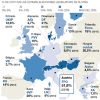(*) Published on 27/6/2016 in The Diplomat in Spain.
At the moment, David Cameron must be regretting the promise of referendum he made in January 2013 and that has only allowed him to enjoy 13 months of absolute majority. This decision has not only made him fall, it also threatens to trigger an internal battle of unpredictable consequences in the Conservative Party. It has also polarized the British citizens unnecessarily and has put at risk the United Kingdom’s territorial integrity and the future of the community project.
Beyond that, there are specific implications for Spain. The predictable volatility of markets has hit the Spanish selective index especially hard, which lost 12.35% on Friday, a number that compared to the 3.1% lost by the British index is even more striking. Besides, the fear of the fall of the pound (right now to barely €1.23) having an impact on tourism, given the loss of purchasing power of the British, seems to be founded. Only in 2015, 15.67 million British tourists came to Spain, which means 21.6% of the foreign visitors.
There is also a considerable uncertainty facing what the Brexit can mean for other aspects of the close economic relations between both countries, such as investments and exports. Let us not forget that the United Kingdom is the first destination country for Spanish investments, whereas the British are the fifth investing the most in Spain. Let us not forget either that, in 2015, the United Kingdom was the fourth destination for Spain’s exports, as well as its sixth supplier.
“Spain, as fourth country of the EU, will have to co-lead in the collective process of reflection more actively”
Regarding medium-long term effects, these will depend, to a large extent, on how tidy the British exit is (if it takes place, since there are voices asking for a second referendum, and much debate about whether Westminster, with pro-Bremain majority, must accept the Brexit or new elections must be called). The other key element will be the agreement reached with the European Union in the end. Now, of course, Spaniards living in the United Kingdom (according to official data, around 200,000) and British living in Spain (more than 300,000) will see how their legal situation does not change at all until the Brexit is put into effect (at least 2 years since article 50 of the TEU is set in motion, which will be in October at the earliest).
Once the Brexit takes place, it will have to be analyzed what is the new framework of relations between the EU and the United Kingdom, if there is one by then. Nevertheless, imagining a situation in which an agreement is not reached by then, the specially interwoven relationship between Spain and the United Kingdom makes recommendable to find alternative ways, even if it is bilaterally, since to that already expounded we would have to add the hardly solvable contentious of Gibraltar.
However, apart from all those problems, which are not minor, the shock forces to reconsider the European project. That is an opportunity for a country like Spain, which must form a government fast to be in the vanguard of the integration project. Spain is going to become the fourth most important country of the EU and it must assume the responsibility of co-leading the collective process of reflection, in a much more proactive way than until now. There is no time to lose, as proved by the recent meeting in which only founding countries participated. There are no excuses to, in the immediate future, exclude Spain from any initiative to talk about the Europe of the future.
Salvador Llaudes
Analyst, Elcano Royal Institute | @sllaudes

